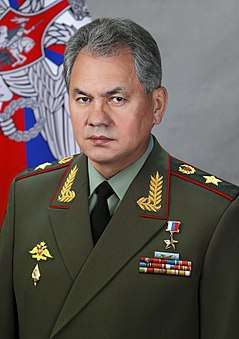Ministry of Defence (Russia)
| Министерство обороны Российской Федерации | |
.svg.png) Ministry emblem | |
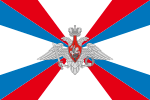 Official flag | |
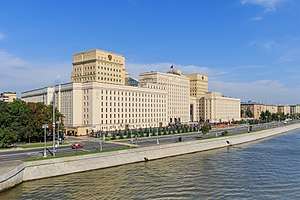 A building of the ministry in Khamovniki District | |
| Agency overview | |
|---|---|
| Formed | 1717 as College of War |
| Preceding agencies |
|
| Jurisdiction | President of Russia |
| Headquarters |
Znamenka 19, Moscow, Russia[1] 55°44′56″N 37°36′8″E / 55.74889°N 37.60222°ECoordinates: 55°44′56″N 37°36′8″E / 55.74889°N 37.60222°E |
| Annual budget | US$ 69.3 billion (2014) |
| Minister responsible | |
| Child agency |
|
| Website |
www |
The Ministry of Defence of the Russian Federation (Russian: Министерство обороны Российской Федерации, Минобороны России, informally abbreviated as МО, МО РФ or Minoboron) is the governing body of the Russian Armed Forces.
The President of Russia is the Commander-in-Chief of the Armed Forces of the Russian Federation and directs the activity of the Ministry. The Defence Minister exercises day-to-day administrative and operational authority over the armed forces.[2] The General Staff executes the president′s and the defence minister's instructions and orders.
The main building of the ministry, built in the 1980s, is located on Arbatskaya Square, near Arbat Street. Other buildings of the ministry are located throughout the city of Moscow. The supreme body responsible for the Ministry's management and supervision of the Armed Forces is The National Defense Management Center (Национальный центр управления обороной РФ) located on Frunze Naberezhnaya and responsible for the centralization of the Armed Forces' command.
The current Russian Minister of Defence is Sergey Shoygu.
History
| Armed Forces of the Russian Federation |
|---|
.svg.png) |
| Services (vid) |
| Independent troops (rod) |
| Other troops |
|
| Ranks of the Russian Military |
| Uniforms of the Russian Military |
| History of the Russian military |
The authors of the U.S. Library of Congress Country Studies' volume for Russia said in July 1996 that:
The structure of the Russian Defense Ministry does not imply military subordination to civilian authority in the Western sense.[3] The historical tradition of military command is considerably different in Russia. The tsars were educated as officers, and they regularly wore military uniforms and held military rank. Josef Stalin in his later years in power frequently wore a military uniform, and he assumed the title Generalissimo of the Soviet Union. Likewise, Soviet leader Leonid Brezhnev was named Marshal of the Soviet Union. By tradition dating back to the tsars, the Minister of Defense was a uniformed officer,' with military background (Dmitry Milyutin, Rodion Malinovsky) or without (Dmitriy Ustinov). The State Duma also seats a large number of deputies who are active-duty military officers—another tradition that began in the Russian imperial era. These combinations of military and civilian authority ensure that military concerns are considered at the highest levels of the Russian government.
Russian Federation
In May 1992, President of Russia Boris Yeltsin appointed General of the Army Pavel Grachev to the post of Minister of Defence. Grachev's decision to side with Yeltsin in the Russian constitutional crisis of 1993, when the president called up tanks to shell the Russian White House to blast his opponents out of parliament, effectively deprived the Supreme Soviet of Russia of its nominal an opportunity to overturn the president's authority. At least partly for that reason, Yeltsin retained his defence minister despite intense criticism of Grachev's management of the First Chechen War and the Russian military establishment in general. Finally, Yeltsin's victory in the first round of the 1996 Russian presidential election spurred Yeltsin to dismiss Grachev.
In March 2001, Sergei Ivanov, previously secretary of the Security Council of the Russian Federation was appointed defence minister by President Vladimir Putin, becoming Russia's first non-uniformed civilian defence minister.[4] Putin called the personnel changes in Russia's security structures coinciding with Ivanov's appointment as defence minister "a step toward demilitarizing public life." Putin also stressed Ivanov's responsibility for overseeing military reform as defence minister. What Putin did not emphasise was Ivanov's long service within the KGB and FSB and his then rank of General-Lieutenant within the FSB. Such military and security agency associated men are known as siloviki.
As of 2002 there were four living Marshals of the Soviet Union. Such men are automatically Advisors to the Defence Minister. The Marshals alive at that time were Viktor Kulikov, Vasily Petrov, Sergei Sokolov, a former Minister of Defence of the Soviet Union, and Dmitri Yazov. Yazov was listed by the American analysts Scott and Scott in 2002 as a consultant to the (former 10th) Directorate for International Military Cooperation[5]
Perhaps the first 'real' non-uniformed Defence Minister was Anatoliy Serdyukov, appointed in February 2007. Serdyukov was a former Tax Minister with little siloviki or military associations beyond his two years' military service.
Structure
The Ministry of Defence is managed by a collegium chaired by the Defence Minister and including the deputy Defence Ministers, heads of Main Defence Ministry and General Staff Directorates, and the commanders of the Joint Strategic Commands/Military Districts, the three Services, and three branches, who together form the principal staff and advisory board of the Minister of Defence.
The executive body of the Ministry of Defence is the General Staff of the Armed Forces of the Russian Federation. It is commanded by the Chief of General Staff. U.S. expert William Odom said in 1998 that 'the Soviet General Staff without the MoD is conceivable, but the MoD without the General Staff is not.'[6] Russian General Staff officers exercise command authority in their own right. In 1996 the General Staff included fifteen main directorates and an undetermined number of operating agencies. The staff is organized by functions, with each directorate and operating agency overseeing a functional area, generally indicated by the organization's title.
Military Thought is the military-theoretical journal of the Ministry of Defence, and Krasnaya Zvezda its daily newspaper.
Structure 2018
Senior staff in 2018 included:[7]
Minister of Defence:
- Minister of Defence of the Russian Federation – General of the Army Sergei Shoigu (since 6 November 2012)
First Deputy Minister(s) of Defence:
- Chief of the General Staff of the Armed Forces of the Russian Federation – First Deputy Minister of Defence of the Russian Federation – General of the Army Valery Gerasimov (since 9 November 2012)
- First Deputy Minister of Defence of the Russian Federation – Active State Advisor of the Russian Federation, 1st Class Ruslan Tsalikov (since 24 December 2015)
Deputy Minister(s) of Defence:
- State Secretary – Deputy Minister of Defence of the Russian Federation – General of the Army (Retired) Nikolay Pankov (since 13 September 2005)
- Deputy Minister of Defence of the Russian Federation (Responsible for Organising Material-Technical Support for the Armed Forces) – General of the Army Dmitry Bulgakov (since 27 July 2010)
- Deputy Minister of Defence of the Russian Federation (Responsible for Organising Financial Support for the Armed Forces) – Active State Advisor of the Russian Federation, 1st Class Tatiana Shevtsova (since 4 August 2010)
- Deputy Minister of Defence of the Russian Federation – Supervisor of the Apparatus of the Ministry of Defence of the Russian Federation – Colonel General Yuriy Sadovenko (since 7 January 2013)
- Deputy Minister of Defence of the Russian Federation (Responsible for the Development of the Technical Basis for the Management System and Information Technology) – General of the Army Pavel Popov (since 7 November 2013)
- Deputy Minister of Defence of the Russian Federation (Responsible for Organising Property Management, Quartering of Troops (Forces), Housing, and Medical Support for the Armed Forces) – Active State Advisor of the Russian Federation, 2nd Class Timur Ivanov (since 23 May 2016)
- Deputy Minister of Defence of the Russian Federation (Responsible for Organising International Military and Military-Technical Cooperation) – Colonel General Alexander Fomin (since 31 January 2017)
- Deputy Minister of Defence of the Russian Federation (Responsible for Organising Military-Technical Support for the Armed Forces) – Aleksey Krivoruchko (since 13 June 2018)
- Deputy Minister of Defence of the Russian Federation – Chief of the Main Directorate for Political-Military Affairs of the Russian Armed Forces – Colonel General Andrey Kartapolov (since 30 July 2018)
Entities directly subordinated to the Minister of Defence in August 2012 included:[7]
- MOD Press Service and Information Directorate
- MOD Physical Training Directorate
- MOD Financial Auditing Inspectorate
- MOD Main Military Medical Directorate
- MOD State Order Placement Department
- MOD Property Relations Department
- Expert Center of the MOD Staff
- MOD Administration Directorate
- MOD State Defence Order Facilitation Department
- MOD Department of the State Customer for Capital Construction
- MOD State Architectural-Construction Oversight Department
- MOD Sanatoria-resort Support Department
- MOD Housekeeping Directorate
|
Outline structure 2004
An outline structure of the Ministry of Defence includes the groupings below, but this structure was in transition when it was recorded in 2004, with several deputy minister posts being abolished:[8]
|
|
List of Ministers of Defence

Marshal of Aviation Yevgeny Shaposhnikov was the last Minister of Defence of the Soviet Union. General Colonel Konstantin Kobets supported then President of the Russian Soviet Federative Socialist Republic Boris Yeltsin during the August coup of 1991. From 19 August until 9 September 1991, Konstantin Kobets was Defense Minister of the RSFSR, though there was no ministry.[10] This post was then abolished.
The first Minister of Defence of the Russian Federation was Boris Yeltsin, who appointed himself to the position by a decree of mid March 1992.[11]
| # | Picture | Name | Military rank | Took office | Left office | President served under |
|---|---|---|---|---|---|---|
| 1 | Konstantin Kobets | Colonel General General of the Army |
20 August 1991 | 9 September 1991 | Boris Yeltsin | |
| Between 9 September 1991 and 7 May 1992 the Russian Federation de jure didn't have its own Minister of Defence. During this period its armed forces were under control of Minister of Defence of the Soviet Union Yevgeny Shaposhnikov. | ||||||
| – |  |
Boris Yeltsin | No military rank | 16 March 1992 | 18 May 1992 | Himself |
| 2 | 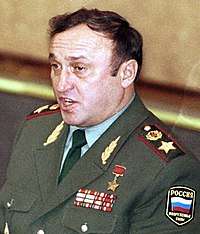 |
Pavel Grachev | General of the Army | 18 May 1992 | 18 June 1996 | Boris Yeltsin |
| – | Mikhail Kolesnikov | General of the Army | 18 June 1996 | 17 July 1996 | ||
| 3 | 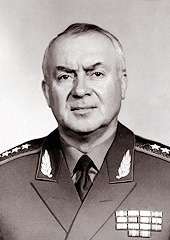 |
Igor Rodionov | Colonel General General of the Army General of the Army in reserve |
17 July 1996 | 22 May 1997 | |
| 4 |  |
Igor Sergeyev | Marshal of the Russian Federation | 22 May 1997 | 28 March 2001 | Boris Yeltsin Vladimir Putin |
| 5 |  |
Sergei Ivanov | FSB Colonel General in reserve | 28 March 2001 | 15 February 2007 | Vladimir Putin |
| 6 | 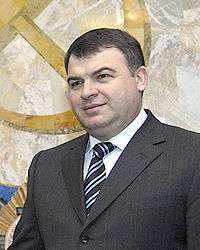 |
Anatoly Serdyukov | No military rank | 15 February 2007 | 6 November 2012 | Vladimir Putin Dmitry Medvedev Vladimir Putin |
| 7 |
|
Sergey Shoygu | General of the Army | 6 November 2012 | Present | Vladimir Putin |
Former First Deputy Ministers of Defence
- Andrei Kokoshin (3 April 1992 – 25 January 1996); (25 January 1996 – 28 August 1997), State Secretary
- Pavel Grachyov (3 April 1992 – 18 May 1992)
- Viktor Dubynin (10 June 1992 – 22 November 1992), Chief of the General Staff of the Armed Forces
- Mikhail Kolesnikov (23 December 1992 – 18 October 1996), Chief of the General Staff of the Armed Forces
- Viktor Samsonov (18 October 1996 – 22 May 1997), Chief of the General Staff of the Armed Forces
- Anatoly Kvashnin (23 May 1997 – 19 June 1997), Acting Chief of the General Staff of the Armed Forces; (19 June 1997 – 19 July 2004), Chief of the General Staff of the Armed Forces
- Nikolai Mikhailov (11 September 1997 – 28 March 2000), State Secretary
- Vladimir Matyukhin (11 March 2003 – 21 May 2004)
- Yury Baluyevsky (19 July 2004 – 3 June 2008), Chief of the General Staff of the Armed Forces
- Aleksandr Belousov (19 July 2004 – 25 September 2007)
- Aleksandr Kolmakov (25 September 2007 – 21 June 2010)
- Nikolai Makarov (3 June 2008 – 9 November 2012), Chief of the General Staff of the Armed Forces
- Vladimir Popovkin (21 June 2010 – 29 April 2011)
- Aleksandr Sukhorukov (1 September 2011 – 9 November 2012)
- Arkady Bakhin (9 November 2012 – 17 November 2015)
Former Deputy Ministers of Defence
- Georgy Kondratyev (10 June 1992 – 9 February 1995)
- Valery Mironov (10 June 1992 – 9 February 1995)
- Vladimir Toporov (10 June 1992 – 28 March 2001)
- Boris Gromov (24 June 1992 – 16 March 1995)
- Konstantin Kobets (?? June 1993 – 18 May 1997), Chief Military Inspector of the Armed Forces of the Russian Federation
- Matvei Burlakov (23 August 1994 – 9 February 1995)
- Anatoly Solomatin (9 February 1995 – ?? April 1997), Chief of Construction and Quartering of Troops
- Vladimir Churanov (17 January 1995 – 16 June 1997), Chief of Logistics of the Armed Forces of the Russian Federation
- Aleksandr Kosovan (?? April 1997 – 6 March 2003), Chief of Construction and Quartering of Troops
- Vladimir Isakov (30 June 1997 – 2 December 2008), Chief of Logistics of the Armed Forces of the Russian Federation
- Mikhail Dmitriyev (13 November 2000 – 8 April 2004)
- Aleksei Moskovsky (28 March 2001 – 19 April 2007), Chief of Armament of the Armed Forces of the Russian Federation
- Igor Puzanov (28 March 2001 – 18 October 2004), State Secretary
- Lyubov Kudelina (28 March 2001 – 18 October 2004), Chief of the Main Financial-Economic Administration of the Ministry of Defence of the Russian Federation and Deputy Minister of Defence of the Russian Federation for Financial-Economic Work; (1 September 2007 – 14 April 2009), Deputy Minister of Defence of the Russian Federation for Financial-Economic Work
- Nikolai Kormiltsev (28 April 2001 – 29 September 2004), Commander-in-chief of the Land Force
- Anatoly Grebenyuk (4 March 2003 – 18 October 2004), Chief of Construction and Quartering of Troops
- Nikolai Makarov (19 April 2007 – 3 June 2008), Chief of Armament of the Armed Forces of the Russian Federation
- Oleg Eskin (19 November 2007 – 20 November 2008)
- Vladimir Popovkin (?? July 2008 – 21 June 2010), Chief of Armament of the Armed Forces of the Russian Federation
- Vladimir Filippov (17 September 2008 – 12 January 2010), Chief of Quartering and Accommodation
- Dmitry Chushkin (20 November 2008 – 15 November 2012)
- Dmitry Bulgakov (2 December 2008 – 27 July 2010), Chief of Logistics of the Armed Forces of the Russian Federation
- Vera Chistova (14 April 2009 – 4 November 2010), Deputy Minister of Defence of the Russian Federation for Financial-Economic Work
- Grigory Naginsky (12 January 2010 – 6 July 2010), Chief of Quartering and Accommodation; (6 July 2010 – 22 April 2011)
- Mikhail Mokretsov (27 July 2010 – 5 July 2011), Chief of Staff of the Minister of Defence of the Russian Federation; (5 July 2011 – 10 December 2011)
- Yelena Kozlova (25 June 2012 – 15 November 2012)
- Oleg Ostapenko (9 November 2012 – 9 October 2013)
- Ruslan Tsalikov (15 November 2012 – 24 December 2015)
- Aleksei Dyumin (24 December 2015 – 2 February 2016)
- Anatoly Antonov (2 February 2011 – 29 December 2016)
- Yury Borisov (15 November 2012 – 18 May 2018)
See also
References
- ↑ RF MOS website www.mil.ru accessed 9 August 2012.
- ↑ Федеральный закон от 31 мая 1996 г. № 61-ФЗ «Об обороне» See Article 13, §§ 1, 2.
- ↑ Library of Congress Country Studies Russia, Command Structure
- ↑ Peter Finn, Russian Leader Expands Powers of a Possible Successor, Washington Post, 16 February 2007.
- ↑ Harriet F. Scott and William Scott, Russian Military Directory 2002, p. 341, citing DS2002-0802.
- ↑ William Eldridge Odom, 'The Collapse of the Soviet Military,' Yale University Press, 1998, ISBN 0-300-08271-1, p. 27.
- 1 2 RF MOD website www.mil.ru accessed 2 July 2018.
- ↑ H.F. Scott & William F. Scott, Russian Military Directory 2004, pp. 61–82, 97–116.
- ↑ State Secretary, Deputy Minister of Defence Archived 2008-04-11 at the Wayback Machine., Russian Ministry of Defence, accessed May 2008.
- ↑ Vladimir Orlov, Roland Timerbaev, and Anton Khlopkov, Nuclear Nonproliferation in U.S.-Russian Relations: Challenges and opportunities, PIR Library Series, 2002, p. 24. Accessed at "Archived copy" (PDF). Archived from the original (PDF) on 2011-07-27. Retrieved 2010-06-07. 7 June 2010.
- ↑ Odom, 1998, p. 385.
External links
| Wikimedia Commons has media related to Ministry of Defence of Russia. |
- Official website

